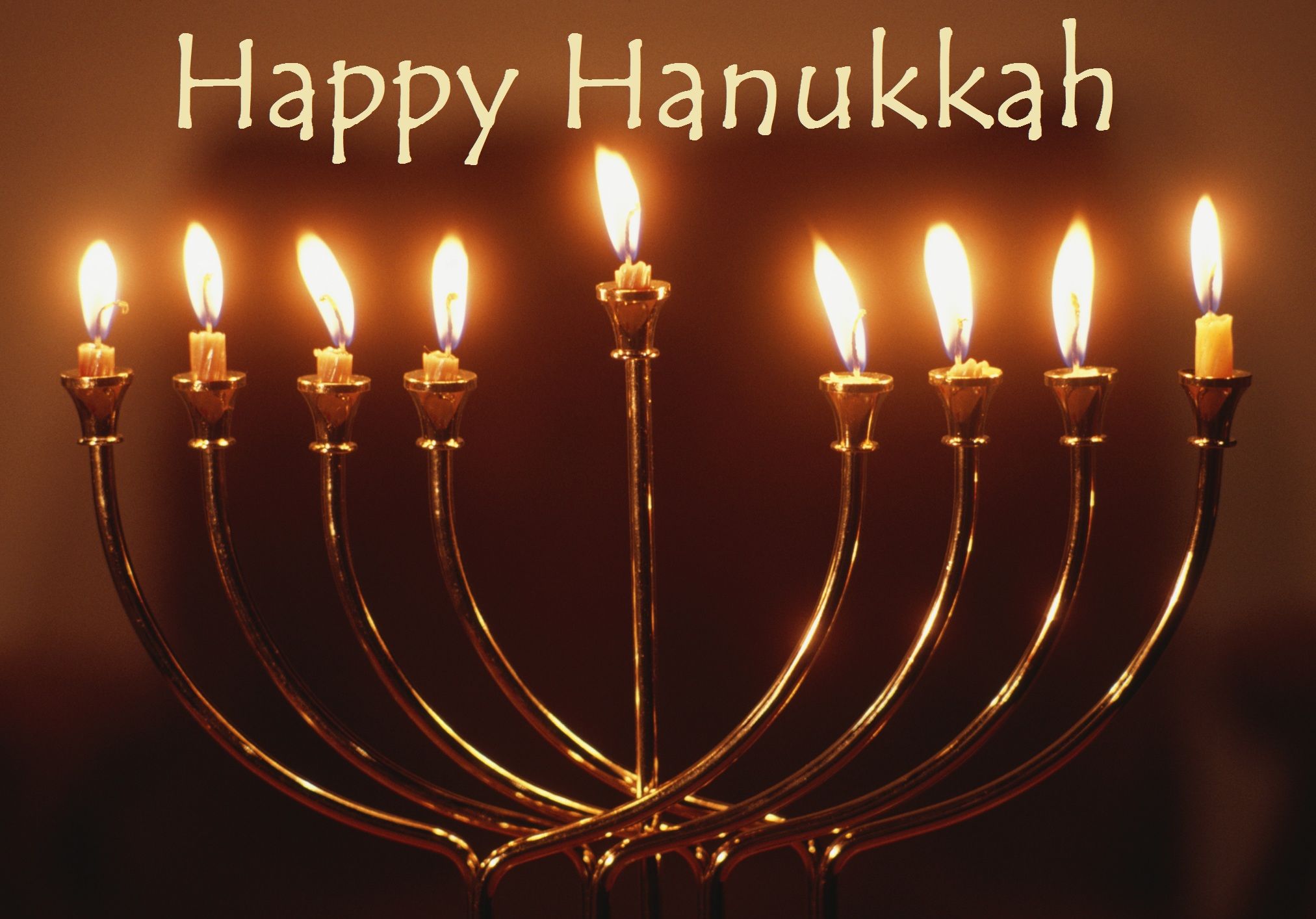Begins November 28, 2021 after nightfall and ends after nightfall of December 6, 2021
(This Document contains G-d’s Name, therefore it may NOT be thrown out)
The Historical Background of Chanukah:
The Hebrew word Chanukah means “dedication.” In the 2nd century BCE, during the time of the Second Holy Temple, the Syrian-Greek regime of Antiochus sought to pull Jews away from Judaism, with the hopes of assimilating them into Greek culture. Antiochus outlawed Jewish observance ― including circumcision, Shabbat, and Torah study ― under penalty of death. As well, many Jews ― called Hellenists ― began to assimilate into Greek culture, taking on Greek names and marrying non-Jews. This began to decay the foundation of Jewish life and practice.
When the Greeks challenged the Jews to sacrifice a pig to a Greek god, a few courageous Jews took to the hills of Judea in open revolt against this threat to Jewish life. Led by Matitiyahu, and later his son Judah the Maccabee, this small band of pious Jews led guerrilla warfare against the Syrian-Greek army.
Antiochus sent thousands of well-armed troops to crush the rebellion, but after three years the Maccabees beat incredible odds and miraculously succeeded in driving the foreigners from their land. The victory was on the scale of Israel defeating the combined super-powers of today.
Jewish fighters entered Jerusalem and found the Holy Temple in shambles and desecrated with idols. The Maccabees cleansed the Temple and re-dedicated it on the 25th of Kislev. When it came time to re-light the Menorah, they searched the entire Temple, but found only one jar of pure oil bearing the seal of the High Priest. The group of believers lit the Menorah anyway and were rewarded with a miracle: That small jar of oil burned for eight days, until a new supply of oil could be brought.
From then on, Jews have observed a holiday for eight days, in honor of this historic victory and the miracle of the oil. We celebrate Chanukah by kindling the Menorah for eight days, adding a new light each night. Adding a candle encourages us to grow spiritually and to continuously add holiness to our lives. This is the essence of our faith and it is symbolized by the manner in which we light our Menorahs.
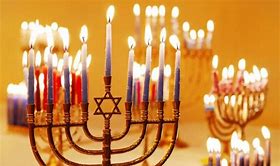
Lighting of the Candles
Both men and women are obligated to light the Chanukah menorah, or to participate in the household menorah lighting. Many have the custom to place the menorah on a windowsill.
On SUNDAY evening, November 28, 2021 after the nightfall 5:19 pm Philadelphia time – we kindle the 1st light of Chanukah.
For exact times based on your location visit:
Zmanim – Halachic Times (chabad.org)
How to Light
On the first night, place one candle at the far right, as you face the menorah. This applies whether the menorah is placed next to a doorway or by a window. Another candle is placed for the Shamash (taller helper candle) which is used to light the others. It is not counted as one of the candles. First light the Shamash, then recite the blessings, and then use the Shamash to light the Chanukah candle.
On the second night, place two candles in the two far-right positions ― and use the Shamash to light the left one first. The third night, place three candles in the three far-right positions ― and use the Shamash to light them in order, from left to right. Follow this same procedure each night of Chanukah… until all the lights are kindled and glowing brightly! Remember as you gaze upon this spiritual light, it’s not only the light of the Menorah, but the eternal Jewish light in our souls.
Blessings to Say
On the first night of Chanukah (Sunday, November 28, 2021 after 5:04 pm) , recite all three blessings. On all subsequent nights, recite blessings number 1 and 2.
1. Ba-ruch A-tah Ado-nai Eh-lo-hei-noo Meh-lech Ha-olam A-sher Ki-deh-sha-noo Beh-mitz-vo-tav Veh-tzi-va-noo Leh-had-lik Ner Cha-noo-kah.
Blessed are You, L‑rd our G‑d, King of the universe, who has sanctified us with His commandments, and commanded us to kindle the Chanukah light.
2. Ba-ruch A-tah Ado-nai Eh-lo-hei-nu Meh-lech Ha-olam Sheh-a-sa Nee-sim La-avo-tei-noo Ba-ya-mim Ha-hem Bee-z’man Ha-zeh.
Blessed are You, L‑rd our G‑d, King of the universe, who performed miracles for our forefathers in those days, at this time.
3. Ba-ruch A-tah Ado-nai Eh-lo-hei-noo Me-lech Ha-olam Sheh-heh-cheh-ya-noo Veh-kee-yeh-ma-noo Veh-hee-gee-a-noo Liz-man Ha-zeh.
Blessed are You, L‑rd our G‑d, King of the universe, who has granted us life, sustained us, and enabled us to reach this occasion.
For the first half hour when the candles are burning, it is customary to sit by the candles and tell stories relating to the holiday. Work should not be done in the proximity of the burning candles. Women have a custom to refrain from household work during the half hour that the lights are burning, to honor the brave Jewish women who played a significant role in the Chanukah story.
*IMPORTANT: It is forbidden to light a fire on Shabbat, which extends from sunset on Friday evening until nightfall on Saturday night. Therefore, on Friday evening, December 3, the Chanukah lights should be kindled early, before the Shabbat lights, which are lit 18 minutes before sundown, before 4:17 Philadelphia time. Additional oil or larger candles should be used for the Chanukah lights, to make sure they will last a full half hour after nightfall—the standard 30-minute Chanukah candles cannot be used on Friday. From the time the Shabbat candles are lit (Friday evening) until Shabbat ends (after nightfall Saturday night) and until the havdalah prayer (separating Shabbat from the weekday) is recited, the Chanukah menorah should not be relit, moved or prepared. Chanukah lights for Saturday night are kindled only after Shabbat ends after nightfall, December 4 after 5:19 Philadelphia time.
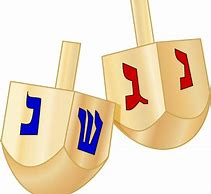
Chanukah Gelt (money).
It is customary to increase one’s daily giving to charity.
It is traditional to give children Chanukah gelt (money).
Of course, this beautiful custom adds to the children’s happiness and festive spirit. In addition, it gives adults an opportunity to give the children positive reinforcement for exemplary behavior. The children should be encouraged to give charity from a portion of their money.
Playing Dreidel (spinning the Chanukah top)
The widespread custom that children have of playing dreidel also reflects the theme of Chanukah. Because the children have the “Chanukah gelt” that they receive from their parents. The dreidels are inscribed with the Hebrew letters nun, gimel, heh, and peh, the initial letters of the words nes gadol hayah poh – “a great miracle occurred here.” Outside the Land
of Israel
, it is customary to replace the peh with a shin, the initial letter of the word sham – “there,” in Eretz Yisrael. Thus, even when the children are playing, the remembrance of the miracle of Chanukah is woven into their games.
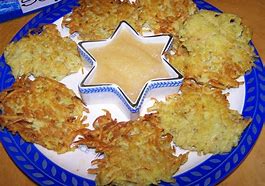
Foods Cooked in Oil
Because of the great significance of oil in the story of Chanukah, it is traditional to serve foods cooked in oil. Among the most popular Chanukah dishes are potato latkes (pancakes) and sufganiot (doughnuts).
Secret
Chanukah on the 25th day of the month. The first twenty four days are represented by the words from the Shema “Baruch Shem Kivod Malchusa Liolam Voed” which contains twenty four letters and the 25th day which is Chanukah is represented by the words “Shema Yisroel Hashem Elokainu Hashem Echad” which contains 25 letters. May the miracles of Chanukah and the protection of Shema Yisroel bring us much blessing and salvation.
Traditional Chanukah Potato Latkes
You’ll need onion, oil, salt, potatoes, eggs, flour and oil. While the recipe works with any type of potato, using Yukon Gold will be much more aesthetically pleasing because they discolor much more slowly than other potatoes and will keep your mixture looking bright and fresh for longer. They also have a buttery taste which will take your latkes to the next level. Most latke recipes call for raw onion, but I like to fry them off first to give the latkes more flavor. Dice the onion and sauté it in 2 tbsp. oil and 1 tsp. salt until golden. Peel and grate the potatoes (by hand or with a food processor) and immediately put the potato shreds into a bowl of cold water. Continue shredding until all the potatoes are grated. Place the eggs, flour, fried onion and 2 tsp. salt in a separate bowl. Drain the grated potato well, add it to the rest of the ingredients and mix immediately. Heat 2-4 tbsp. of oil in a frying pan, over medium heat. Test the oil by dropping a tiny bit of the mixture into the pan. When the oil sizzles upon contact, it is ready. For uniform latkes, use a 1/4 or 1/8 cup measuring cup. Scoop the batter and gently drop it into the oil. Press down gently with the back of the measuring cup to flatten. Fry 2-3 minutes until golden, then flip the latkes and fry 1-2 minutes on the second side. Repeat until all the mixture has been fried. (You will need to add more oil to the pan every couple of batches.)
Ingredients:
- ½ an onion
- 2 tbsp. oil
- 3 tsp. kosher salt, divided
- 1.5 lbs. Yukon Gold potatoes
- 2 eggs
- ¼ cup flour
- Oil for frying
Directions:
- Dice the onion and sauté it in 2 tbsp. oil and 1 tsp. salt until golden.
- Grate the potatoes (by hand or in a food processor). Immediately transfer the grated potato to a bowl of cold water.
- Place the eggs, flour, fried onion and 2 tsp. salt in a separate bowl. Drain the grated potato well, add it to the rest of the ingredients and mix immediately.
- Heat 2-4 tbsp. of oil in a frying pan, over medium heat. Test the oil by dropping a tiny bit of the mixture into the pan. When the oil sizzles upon contact, it is ready.
- For uniform latkes, use a 1/4 or 1/8 cup measuring cup. Scoop the batter and gently drop it into the oil. Press down gently with the back of the measuring cup to flatten. Fry 2-3 minutes until golden, then flip the latkes and fry 1-2 minutes on the second side. Repeat until all the mixture has been fried. (You will need to add more oil to the pan every couple of batches.)
Yields: 16 latkes
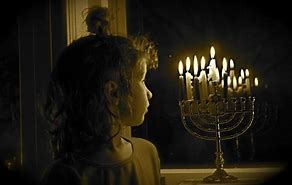
Inspirational Story
In our own lifetime, there are modern day Maccabees. Jewish souls who defied spiritual oppression, and remained connected to HaShem, no matter what.
I.I. Cohen, a survivor of three concentration camps, wrote about his Chanukah experience under Nazi tyranny. Even while interred in various concentration camps, Mr. Cohen was able to keep a mental track of the Jewish calendar. Together with a group of inmates, they reminisced about Chanukah celebrations gone by. Memories of menorahs, latkes and dreidels. How their fathers would light their menorahs with such fervor and joy. How they all longed to feel the warmth of Chanukah. But in a concentration camp?
A plan was hatched. One fellow offered the small dab of his daily ration of margarine to serve as the oil. For wicks, they unraveled threads from their ragged concentration camp uniforms. All they needed now was a menorah.
Mr. Cohen was somehow able to sneak in a spoon. A spoon that would serve as the menorah. With the margarine and threads placed on the makeshift menorah, they lit the “wicks” and recited the blessings. They sang the Chanukah songs, and their souls soared. Modern day Maccabees, bringing spiritual light to the darkest of dark.
Mr. Cohen survived the war. He merited a long life, and built a beautiful family. Children and grandchildren. Every Chanukah, as he lights his silver menorah, he places his Auschwitz spoon alongside it. The triumph of the Jewish soul.(As recorded in the Los Angeles Jewish Journal, December 13, 1999)
I am particularly inspired by the unimaginable strength of Yosef Mendelevich, a refusenik in the former Soviet Union who spent 12 years in the Gulag for defying Communist rule and practicing Judaism. Although in solitary confinement, he was able to keep track of the Jewish calendar, and realized that Chanukah was approaching.
Mendelevich identified with the Maccabees’ fight for spiritual freedom, and resolved to somehow have Chanukah, even in prison. He managed to get a match from one of the guards, and pulled threads from his prison garb, which he braided together to form wicks.
There were still a few days to Chanukah, but he had no idea how he would find a menorah. He eyed a broken piece of brick on his cell’s floor, and with it, etched an image of a menorah upon the cinderblock walls. When Chanukah arrived, he lodged the wicks into the crevices of the wall, and struck his match. While it only remained lit for a few seconds, his heart was filled with renewed hope. Mendelevich was freed as a result of massive international pressure and protests, and received a hero’s welcome in Israel. He intensified his Jewish studies, becoming an inspiration for the Russian community and continues to lead and teach to this day. A true modern day Maccabee, who not only survived, but today devotes his life to spreading Judaism amongst the masses.
ITS TIME TO SHINE! Become THE LIGHT!
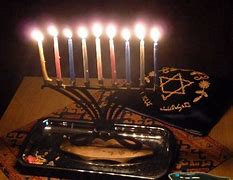
For more information visit on a holiday visit:
https://www.partnersintorah.org/wp-content/uploads/2017/12/chanukah.pdf
and
Hanukkah – Chanukah 2021 – Menorah, Dreidels, Latkes, Recipes, Games and more (chabad.org)

